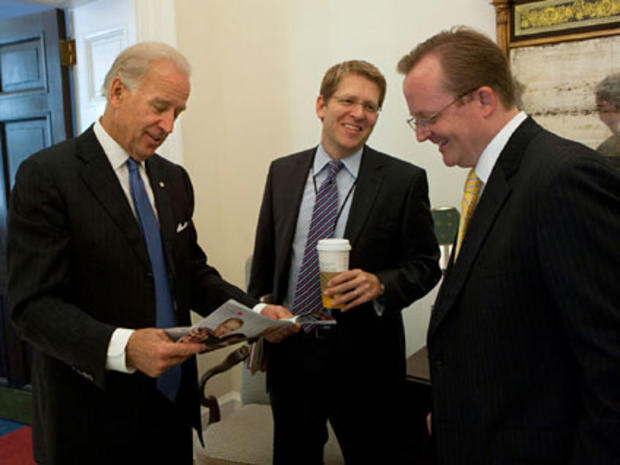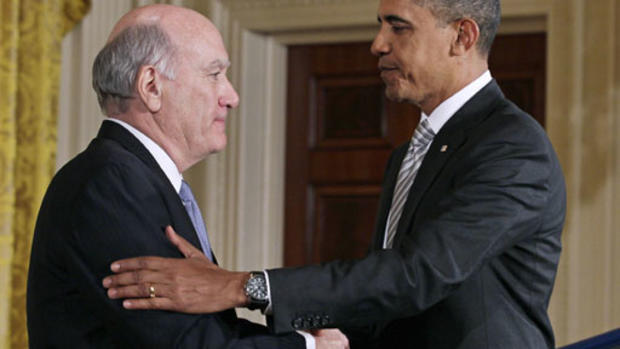What Kind of Press Secretary will Jay Carney Be?
It is the "changing of the guard" at the White House Briefing Room podium. After two years and 250 briefings at that platform, Robert Gibbs was ready for a breakfrom the pressure cooker job. He will eventually jump on the lucrative speech-making circuit and join other former Obama staffers planning the president's re-election campaign.
Gibbs' successor, Jay Carney, previously served as Vice President Biden's spokesman. Carney was a veteran Time Magazine reporter with White House coverage experience in previous administrations. He becomes the first former White House correspondent to serve as press secretary since Ron Nessen, an NBC staffer who became President Gerald Ford's spokesman.
After taking a deep breath before his premier at the podium in the James Brady Briefing Room, Carney pledged to give reporters "the best information." Of course he noted the obvious; that he works for the president. He observed the symbolism of the location of the press secretary's office, about half way between the briefing room and the Oval Office.
Before departing, Robert Gibbs gave some time-honored advice to Carney: "Regardless of what you know and what you're asked, your solemn obligation is to always tell the truth."
Gibbs told reporters, "While that may seem readily obvious, obviously in the past it has not always been the case. The live broadcasts and word-by-word official transcripts of the White House briefing can, in effect, be a "lie detector."
Past press secretaries -- they know who they are -- have learned that the hard way, especially during scandals. (Think Watergate and other difficult times.) That's not to say press secretaries have purposefully lied. They can be the victims of bad information conveyed by White House officials covering themselves and/or their boss in the Oval Office.
There are two kinds of press secretaries. Some have worn two hats; presidential adviser and spokesman. Gibbs fell into that category. As President Obama noted at Gibbs' final briefing, "Robert has not only been an extraordinary press secretary, but he has been a great friend. And you could not ask for somebody better in the foxhole with you during all the twists and turns of my candidacy and then the incredible challenges that we faced over the last two years."
Other press secretaries have simply been "mouthpieces" supplied with talking points but little other information. A chapter in the second Bush administration served as an important lesson about the role and the truthfulness of the press secretary.
The episode replayed recently when a C-SPAN interviewer asked former President George W. Bush why Scott McClellan, his longest-serving press secretary, was not mentioned in the former president's book, "Decision Points," which came out last year. Mr. Bush replied, "He was not a part of a major decision. I didn't think he was relevant."
Mr. Bush's telling assessment was not entirely surprising. McClellan used his own 2008 book, "What Happened: Inside the White House and Washington's Culture of Corruption," to criticize his former boss and key administration aides.
The 43rd president's former spokesman also blamed top officials for causing him to give misleading statements. Referring to the CIA leak case that haunted the Bush White House, McClellan wrote, "I stood at the White House briefing room podium in front of the glare of the klieg lights for the better part of two weeks and publicly exonerated two of the senior most aides in the White House: Karl Rove and Scooter Libby."
"There was one problem. It was not true," McClellan recalled. He concluded, "I had unknowingly passed along false information."
Every White House press secretary, in fact anyone who speaks for any public official, faces the challenge of avoiding the trap that McClellan recounted.
As Jay Carney assumes his responsibilities, he can look to two predecessors who remain as the "gold standard" of White House press secretaries; Marlin Fitzwater and Mike McCurry. Fitzwater uniquely served two presidents, Ronald Reagan and George H.W. Bush. The former Kansas farm boy brought Midwestern common sense to the job. He will be remembered as the man who announced the beginning of the first Persian Gulf War when he said, "The liberation of Kuwait has begun."
He was also the reassuring voice to the nation and the world after President George H.W. Bush became ill during a 1992 visit to Japan. Reporters respected Fitzwater's calm demeanor and the way he accurately reflected the thinking of the first President Bush. Fitzwater's 1995 book, "Call the Briefing," could serve as a textbook for press secretaries at any level of government.
Mike McCurry advised and spoke for Bill Clinton. He served during the Clinton impeachment, one of the most difficult times for a presidential press secretary in recent U.S. history. His performance during that turbulent era defined "grace under fire."
Fitzwater and McCurry knew exactly how to balance their spokesman and advisory roles.
Robert Gibbs was the latest press secretary to face the task. The veteran Obama associate said the "unique relationship" allowed him to know how the president thinks. Gibbs insisted there was no conflict in serving as public spokesman and private adviser with constant access to the decision-making process. Before leaving the White House he told reporters, "I would always rather know than to land on the wrong side of what the truth is."
Some reporters complained that Gibbs' answers were often less than forthcoming.Gibbs said , "I would rather know and have to be cautious than go out here (to the podium) and say something that turned out to be false."
Like all press secretaries, Gibbs had his share of friction with the White House media. Some reporters complained about his lack of availability away from the podium, a possible result of the demands of his advisory role. In a February 2, 2011 column, Washington Post columnist Dana Milbank described Carney's hiring as "a peace offering to an aggrieved White House press corps that has spent two poisonous years with Robert Gibbs, to Obama's detriment."
While Gibbs certainly had his "moments" with reporters, the relationship did not come close to the acrimony seen in previous administrations. Ronald Reagan's press secretary Larry Speakes delighted in putting journalists "out of business" when he did not like their questions or reporting. He refused to take their questions or return their calls. (Full disclosure: Speakes once put me "out of business" when he took exception with an editorial decision made by one of my bosses at a previous place of employment.)
Bottom line: There's no requirement that press secretaries and reporters must get along. Neither side should expect it. There is natural and important tension in the relationship.
Looking ahead, reporters will watch for signs of Jay Carney's access or lack thereof to the Oval Office. So far there have been no public hints beyond the president's recent remark that, "Jay is going to do an outstanding job of filling Robert's [Gibbs] shoes."
As press secretaries for previous presidents have learned, promises of that all-important access can evaporate. The pledges can be obliterated by staff organizational charts that can leave them at the bottom of the informational "food chain" and by West Wing turf battles. Some former press secretaries have told of fighting to be kept in the loop. In coming days and weeks, the new press secretary's level of influence and access will become clear.


